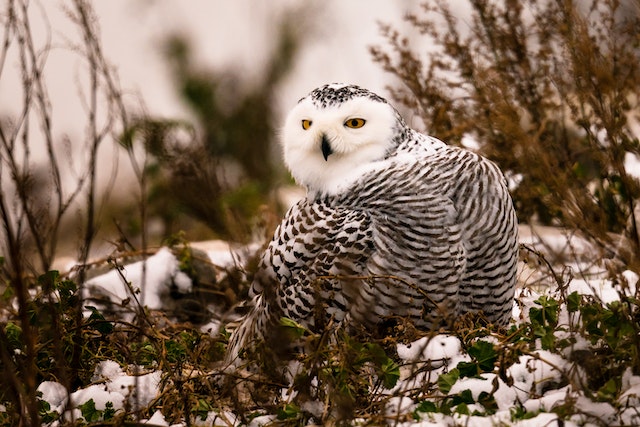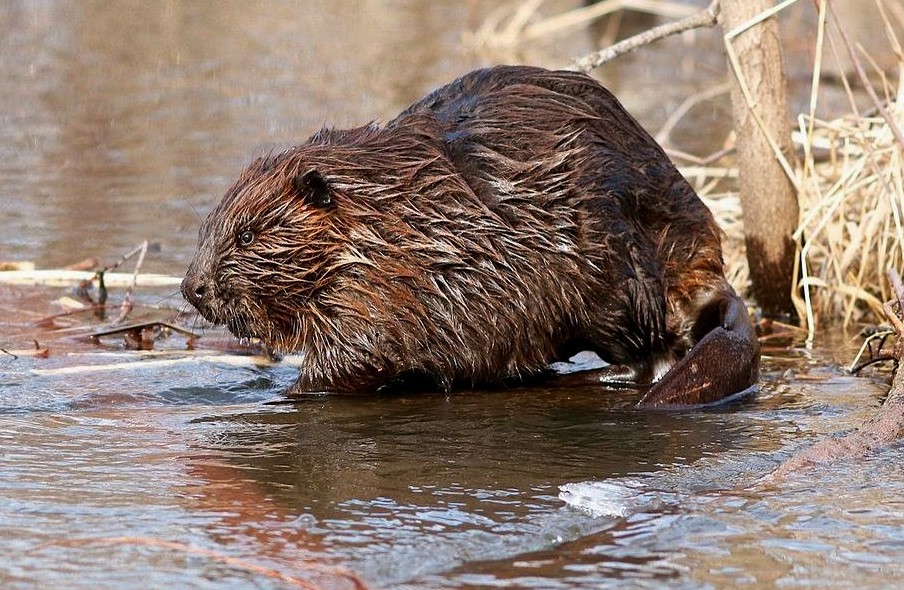

Images: Tina Nord | Pexels (owl); USFWS (beaver)
Op Ed by AFA board member, Molly Tamulevich
Earlier this month, Governor Whitmer issued a proclamation that July would be, “Wildlife Conservation Month” in Michigan. Unfortunately, the text of her proclamation is primarily focused on celebrating Michigan’s ever-shrinking community of hunters. This is a perfect example of the veiled battle being waged for the future of Michigan’s wild animals. The proclamation is a piece of bait and switch publicity that fools Michigan residents into celebrating initiatives that have very little to do with a colloquial or scientific understanding of the word “conservation”.
Unbelievably simplistic, the billboards, promotional materials and website for the Michigan Wildlife Council are uniformly centered on hunters and their reputation rather than on Michigan’s wild animals themselves.
Additionally, it contradicts legislative initiatives championed by many lawmakers, animal advocates and the Michigan Anishinaabek Caucus that aim to reform wildlife management forums in the state. “Wildlife Conservation Month” is nothing more than a self-congratulatory piece of pro-hunting propaganda aligned with Michigan’s most misleading “conservation” group: The Michigan Wildlife Council.
The Michigan Wildlife Council (MWC) is a main character in the Wildlife Conservation Month proclamation. Established in 2013 by Public Act 246, the MWC is required by law to consist of members who represent the following stakeholder groups:
- hunting and fishing license holders
- businesses substantially impacted by hunting and fishing
- the agricultural community
- rural areas of the state whose economies are substantially impacted by hunting and fishing
- someone with a background in media or marketing
The council’s primary goal is to conduct PR campaigns intended to generate positive feelings toward hunters and anglers in the state and promote the narrative that hunters are responsible for the conservation of Michigan’s wild animals. Unbelievably simplistic, the billboards, promotional materials and website for the MWC are uniformly centered on hunters and their reputation rather than on Michigan’s wild animals themselves. This mission would be appropriate if it were carried out by a more aptly named body, perhaps the Michigan Hunting Heritage Council, but this is the Michigan Wildlife Council, and 6 of their 7 meetings in 2023 will take place at shooting sports centers and hunting supply stores rather than venues dedicated to wildlife science, rehabilitation, or education.
There is a deliberate and coordinated effort by special interest groups to conflate public perceptions of wildlife conservation with the narrative that hunting in all forms is good for animals, the environment, and the economy. Conserving wild animals in this narrative is always secondary to preserving the interests of Michigan’s shrinking population of hunters. For context, fewer than 7% of Michiganders hold a hunting license. This is important because the governor’s proclamation falls squarely into the “hunters are heroes” narrative, containing text such as “hunters and anglers were among the first conservationists, pushing for active wildlife management and conservation to ensure wildlife flourishes for future generations”. There is no mention of the fact that over-hunting is the reason that many species need to be conserved in the first place. Again, if this text was part of a proclamation celebrating Michigan’s hunting community it would be appropriate, but this is a proclamation celebrating wildlife conservation month.
The Michigan Wildlife Council is a product of the Nimrod Society, a hunting advocacy group closely affiliated with the Nimrod Education Center. The Center is located at Michigan’s Hillsdale College which is becoming known as influential in conservative circles. The name “Nimrod” is evoked in a Biblical sense, referencing “a mighty hunter before the Lord”. The society proudly claims the Michigan Wildlife Council among its successful projects, lauding the council as a forum to “educate the public about the true values of hunting and fishing”. The MWC, Department of Natural Resources, Natural Resources Commission and other wildlife management bodies are full of Nimrod affiliates. The Governor’s proclamation, largely dedicated to celebrating the MWC, continues the Nimrod agenda: framing hunting as a cherished outdoor tradition, elevating hunters as heroes in the public eye, and ensuring that wildlife is managed for hunters.
The convoluted and deeply entrenched fight for control of Michigan’s wildlife is made clear by juxtaposing the Governor’s proclamation against a pair of bills recently introduced by the House as part of an Indigenous Culture and Heritage bill package. The bills, HB 4855 and HB4856 would require that the MWC and Michigan Wolf Management Advisory Council expand their membership to include representatives of the scientific community, tribal governments, and nonprofits promoting the non-consumptive use of wildlife. These changes would ensure that official forums dedicated to wildlife management will more accurately reflect Traditional Ecological Knowledge, the best available science and the values of Michigan’s non-hunting majority. Unlike the proclamation, these bills recognize that the MWC and other wildlife management forums must undergo reforms to function democratically.
To learn more about how to reform state wildlife management, check out the resources at Wildlife for All. If you would like to help change wildlife management forums in Michigan, call your state Representative and ask them to support House Bills 4855 and 4856. You can also send them a copy of this article and ask them to learn more about these issues.
The discord between the Governor’s proclamation and efforts by sponsors of the bill package is especially critical considering the emphasis that the proclamation places on the scientific management of wild animals, the commitments made to the Anishinaabek community, and the importance of ensuring that the 93% of Michiganders who do not hunt have fair, democratic representation when it comes to the fate of wildlife in our state.
Wildlife management in Michigan is a complicated political issue. There are myriad advisory groups, commissions and agencies involved in decision-making when it comes to our state’s wildlife. Few require or incorporate the input of non-hunters. Convoluted, largely inaccessible to the public, and loaded with jargon, these forums have enormous power over the lives and deaths of Michigan’s wild animals. The average Michigander is unaware of the dynamics that drive many of these official forums, and it is critical that the media as well as lawmakers begin to unravel the sociopolitical agendas that masquerade as conservation in our state. Wildlife Conservation is absolutely worth celebrating, but rather than a misleading proclamation that lauds the efforts of special interest groups like the MWC, Michigan must focus on reforming wildlife management systems and prioritize the conservation of wildlife itself rather than the reputation of our state’s dwindling hunting community.
To learn more about how to reform state wildlife management, check out the resources at Wildlife for All. If you would like to help change wildlife management forums in Michigan, call your state Representative and ask them to support House Bills 4855 and 4856. You can also send them a copy of this article and ask them to learn more about these issues.
